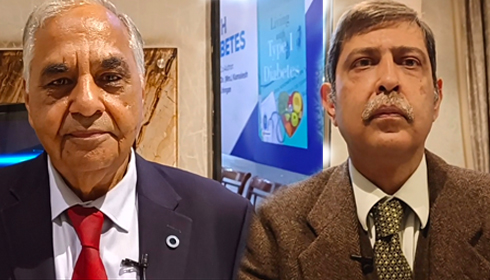
Change your lifestyle before diabetes does, say experts
"Change your lifestyle, else diabetes will change your life", warn doctors. For that people need to develop healthy eating habits, exercise regularly and try to remain stress-free to reduce the risk of developing diabetes, a disease that affects about 422 million people worldwide, the majority living in low-and middle-income countries, killing 1.5 million lives each year.
On the occasion of the launch of his book, Living with Type 1 Diabetes, Dr Ashok Kumar Jhingan, Senior Director, BLK-MAX Hospital, Delhi, said, “When we talk about diabetes, a total of 90% of diabetics are of Type2 diabetes while remaining patients are of Type1 diabetes that usually occurs among children in the age group of 5-14 years.”
"Type 1 diabetes is also reported among some people at the age of 23 or 24, known as LADA (Latent Autoimmune Disease of the Adult), a slow-progressing form of autoimmune diabetes," he added.
Stressing that insulin remains the best diabetes treatment available, Dr Jhingan said, “Its administration has now become advanced.”
“Insulin which used to be administered through injections can now be given through pens and pumps,” he pointed out.
“It is possible that in another couple of years, we may see new treatments for diabetes emerging,” Dr Jhingan further said.
Prof Nikhil Tandon, HoD, Department of Endocrinology, Delhi-AIIMS, said, “In Type1 diabetes, the body’s immune system attacks and destroys the insulin-producing cells of pancreas, thereby decreasing the capacity to produce the hormone, resulting in a surge of glucose in the blood, for which patients have to take insulin from the outside to control the blood sugar level.”
Regarding the prevalence of Type 1 diabetes in children, Prof Tandon said that while the number of diabetes in children is not very high, it should be noted that due to the country's large population, the number of type one diabetic children in India is the highest in the world.
“Around one to one and a half lakh new cases of Type1 diabetes in children every year are reported in India,” he said.
Dr Ashok Kumar Jhingan stressed that children with Type1 diabetes are usually born as any other normal child, but around the age of five, they develop a fever for five days and their blood sugar gradually increases to unhealthy levels.
He added that frequent urination, sudden infection and fever due to which children may become restless bed wetting are some of the symptoms of Type1 diabetes.
Prof Nikhil Tandon said that symptoms of Type 1 diabetes appear all of a sudden and develop rapidly. The capability of developing insulin goes down and sugar level increases to a high level manifesting in the form of frequent thirst, urination and rapid loss of body weight.
Sometimes these symptoms develop at a very young age when nobody even considers checking for diabetes due to which such cases often remain not diagnosed at an early stage.
Prof Tandon said that any child, who is rushed to the emergency, should be tested for diabetes. Usually, Type 1 diabetes is developed under one year of age but it can develop above at any age after one year.
“Diabetic children often face discrimination and are discouraged from participating in outdoor activities by the school authorities, including teachers. However, with increasing awareness, these things are getting better over a period of time,” Dr Ashok Kumar Jhingan said.
Stating that lack of awareness is the main reason behind many diabetics being stigmatised, Dr Jhingan added, “As the diabetic child grows up and enters college or carrier, they often face discrimination owing to being Type1 diabetic, over which they have no control. Similarly, they often face difficulty during marriage as many people believe that such people may pass on the disease to their children.”
Dr Jhingan asserted that in order to reduce the risk of diabetes in children, parents must change their lifestyle and adopt a healthy lifestyle. In fact, as role models for their children, parents who avoid fast food and processed foods may reduce their child's risk of developing Type 2 diabetes.
He pointed out that parents should instil healthy lifestyle habits in their children by the time they reach grade three in school and if these habits are maintained until the child reaches grade five, their chances of developing diseases remain low for the rest of their lives.
“If children are not guided by that time, they may develop bad eating habits, then no one can do anything. Whatever should be done for the betterment of the health of children should start by the time they reach grade three,” Dr Jhingan said.
On causes of Type 1 diabetes, Prof Nikhil Tandon said that this disease is immunity related because the body's immune system attacks the pancreas.
“If the family (parents) has a history of Type 1 diabetes, there are chances of developing this condition in children too. If a male in the family suffers from Type1 diabetes then the chances of diabetes in next-generation increases by 6%, while and if a female suffers from diabetes then the risk of the disease increases by 3%,” Prof Tandon said.
He said that it affects the quality of life as insulin injections needed to be taken three to four times a day but it can be managed.
“As of now only management or treatment of diabetes is insulin injections and medicines,” he added.
“Only collective efforts of all sections of the society, including parents, doctors, nurses, psychiatrists and other stakeholders can overcome the challenges posed by diabetes,” Prof Tandon said.